Who is John Ratcliffe, the Iran hawk heading the CIA?

The new CIA director John Ratcliffe is a vocal proponent of a firm stance against Iran who has called on Washington to follow Israel’s lead in dealing with Tehran.
Iran International congressional reporter

The new CIA director John Ratcliffe is a vocal proponent of a firm stance against Iran who has called on Washington to follow Israel’s lead in dealing with Tehran.
Ratcliffe was the Director of National Intelligence during Trump's first term in office and a prominent voice on national security in the United States. He has said on many occasions that he sees the theocracy in Tehran as a grave threat to both US interests and stability in the Middle East.
In an interview with Fox News last November, Ratcliffe slammed the Obama administration’s approach to Iran, calling it naïve in its reliance on diplomacy to curb Tehran's ambitions.
That approach underestimates “the lethality and evil nature of the Iranian regime,” he said, backing in its stead, Donald Trump’s policy of maximum pressure. Perhaps more notably, he called on the US government to assist Israel in employing what he described as a foot-on-the-throat approach against Tehran.
Ratcliffe’s call for coordinated US-Israeli action against Iran underscores his belief that Tehran’s nuclear program and its support for regional armed groups are existential threats that demand forceful collective action.
This aligns him with those in the intelligence and foreign policy circles who reject diplomatic solutions and say the Islamic Republic responds to strength only. It could, however, point to a potential divergence with President Trump, who has indicated that he would seek a deal before considering other options.
Another disagreement between the two could emerge from the president’s decision to remove security details of former officials, including Mike Pompeo, John Bolton and Brian Hook, who have allegedly faced death threats from Iran over their roles in Trump’s previous administration that killed IRGC’s top commander Qassem Soleimani.
This move has been criticized as dangerous, potentially leaving these individuals vulnerable to Tehran’s retaliation. It may not directly pertain to Ratcliffe’s policy stance on Iran, but it does suggest that Trump’s actions this term could not fully align with the hardline approach that both he and Ratcliffe have previously endorsed.
Overall, Ratcliffe’s stance on Iran is largely in harmony with President Trump’s, both championing a hardline approach, particularly on Tehran’s nuclear program.
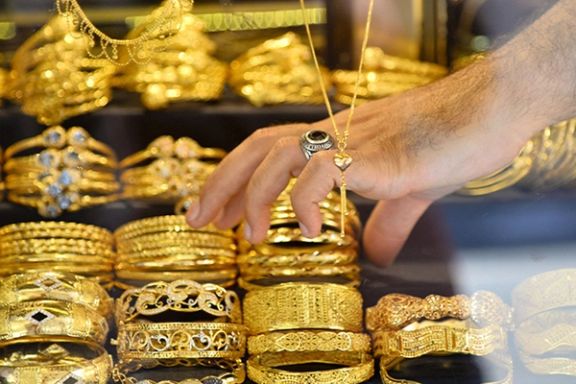
Online gold-selling platforms are gaining traction in Iran, offering fractional ownership of the precious metal as an accessible option for those grappling with financial instability.
The platforms, heavily advertised across Tehran, target lower-income individuals seeking to protect their dwindling savings amidst a falling currency that wipes out their cash savings.
With gold prices soaring to approximately 55 million rials per gram, many Iranians now find traditional methods of purchasing gold increasingly out of reach.
For decades, gold has served as a trusted form of savings and financial security, especially during economic crises. However, with the average worker earning just above 100 million rials per month ($130) and living costs rising sharply, purchasing even a small amount has become unattainable.
The platforms’ promise of affordability has drawn interest but also skepticism. Mizan News Agency, affiliated with the Judiciary, has warned that “fake sales and fraud are among the dangers lurking for gold buyers via online platforms.”
Public trust remains low, partly due to past scandals like the 2016 collapse of Samen Coins, a gold trading company that embezzled 150 trillion rials, devastating thousands of customers and deepening fears about the trustworthiness of online sales.
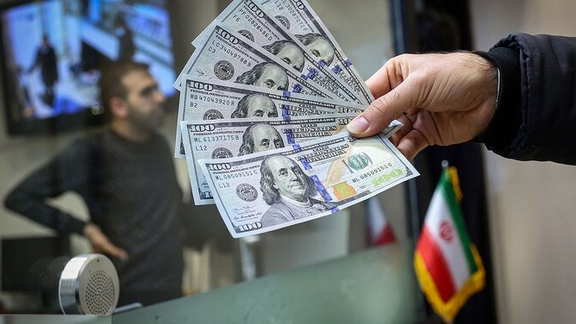
The company engaged in fake sales, selling assets it did not possess, leading to widespread financial losses. The scandal prompted public outrage and legal action, resulting in the arrest and prosecution of key figures. It also highlighted significant regulatory weaknesses in Iran's financial oversight, particularly of online trading platforms, and eroded public trust in such services.
The uncertainty about the platforms is further exacerbated by the relentless depreciation of the rial. Despite hopes that the dollar’s upward trend would stabilize following Donald Trump's comments of resolving Iran issue without military conflict, the US dollar has surged to approximately 850,000 rials, breaking new records. Economic expert Ali Sadeghin notes that while negotiations between Iran and the US remain uncertain, inflationary expectations continue to drive the dollar’s rise.
Sadeghin explained to Titre-Avval-e Eghtesad website, “If negative news is injected into the market, the dollar's price will move to a higher threshold. Overall, the dollar could rise above its current level.”
The broader impact of the economic crisis extends beyond finance. Sociology professor Zahra Ojagh observed that rising poverty and currency devaluation are eroding social trust and increasing conflict. “When a society becomes poorer, healthy interactions decline, leading to heightened mistrust and conflict,” she added.
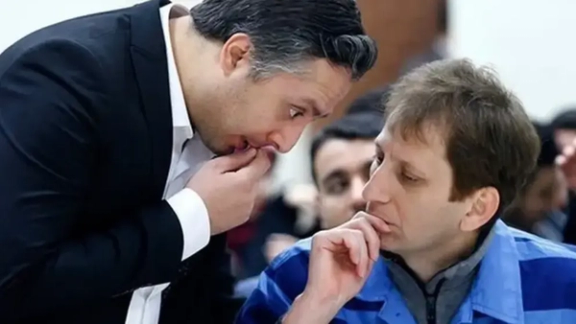
Iran's judiciary has refuted claims suggesting that Babak Zanjani, the convicted business magnate at the heart of a major corruption scandal, has been granted release, saying that his status has not changed.
Recent reports by Iranian media and social media users had fueled speculation that Zanjani, once Iran's richest man, might be involved in launching a cryptocurrency bank, suggesting his return to economic activities.
“In light of the speculation regarding changes in Babak Zanjani's status and reports by some media outlets suggesting his release, the previous statements by the Judiciary Spokesperson on this matter remain accurate, and no changes have occurred in his status,” state-controlled ISNA quoted the office of the Judiciary as saying.
The Judiciary further stated that Zanjani, like other defendants who have shown remorse and have cooperated, is receiving assistance under judicial directives and the supervision of special investigators. The former tycoon has also been granted the opportunity to take compensatory actions in coordination with relevant authorities.
The Judiciary has affirmed that Zanjani's foreign assets have been located and brought back to Tehran. The Central Bank Governor has corroborated this, confirming that the returned assets, in the form of foreign currency, have been entirely deposited into the bank's treasury.
Zanjani gained notoriety during Mahmoud Ahmadinejad's presidency for his role in evading international sanctions against Tehran. As a key intermediary, Zanjani helped the state sell oil and secure foreign currency, amassing considerable wealth and influence in the process, despite the restrictions related to Iran's nuclear activities.
Zanjani later faced accusations of embezzling billions of dollars from Iran's state oil revenues, leading to his arrest in December 2013 and subsequent charges of corruption. His 2016 death sentence, although never carried out, was reported by media outlets across the globe.
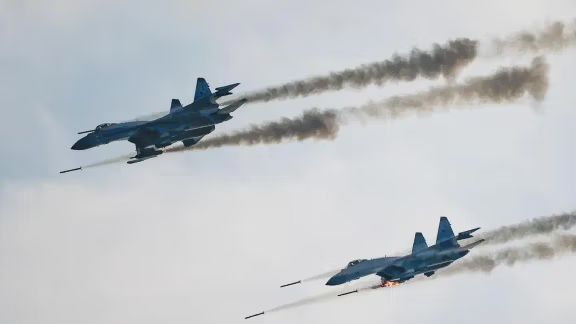
As Tehran and Moscow continue military cooperation, Iran has acquired advanced Sukhoi-35 fighter jets from Russia to bolster its military capabilities, Iran's state-affiliated Student News Network reported on Monday.
Ali Shadmani, the deputy coordinator of IRGC's Khatam-ol-Anbia Central Headquarters said: "Whenever necessary, we make military purchases to strengthen our air, land, and naval forces. [...] The production of military equipment has also accelerated."
Referring to Iran's regional archival Israel, he warned: "If the enemy acts foolishly, it will taste the bitter taste of being hit by our missiles, and none of its interests in the occupied territories will remain safe."
Shadmani did not specify whether the jets have already been delivered to Iran.
In November 2023, Iran's state media said Tehran had finalized arrangements to buy Russian fighter jets.
Iran announced its intention to purchase of Sukhoi-35 fighter jets from Russia in 2022. Iranian officials announced on several occasions during the past few years that Russia would sell several Sukhoi Su-35 fighter jets to Iran, but such claims had never yielded any results.
The negotiations for advanced Russian fighter jets date back to 2007 when Iran explored acquiring Su-30MKs. However, United Nations sanctions and Russian hesitation halted the potential deal. Renewed discussions in 2015 for Su-30SM jets, including a request for domestic production rights, were also unsuccessful.
According to German aviation industry magazine Flug Revue, the first two Sukhoi Su-35SE fighter jets were officially handed over to the Iranian air force on November 18, during a private ceremony at the Komsomolsk-on-Amur Aircraft Plant (KnAAPO), the German outlet said.
The two aircraft were transported disassembled on an Antonov An-124-100 cargo plane to Mehrabad Airport in Tehran. After arrival, they were moved to the 3rd Tactical Air Force Base near Hamadan for assembly.
Initially, the order was for 25 Su-35SE aircraft to replace the IRIAF’s aging US-made Grumman F-14A Tomcats stationed in Isfahan, but it was later expanded to 50 units to also replace F-4E Phantom II aircraft based in Hamadan.
The Russian air force has also suffered losses in combat during its invasion of Ukraine and has not been able to establish air superiority against a much smaller enemy air force.
Faced with a technologically outdated air force comprised of a few dozen strike aircraft, some dating back to the pre-1979 revolution era, Iran has prioritized the development of drones and missiles.
Iran has supplied hundreds of drones to Russia that have been used to target Ukraine's military and civilian infrastructure, according to the United States. Moscow denies that its forces use Iranian-built drones in Ukraine, although many have been shot down and recovered there.
In November 2023, satellite imagery showed the construction of a plant in Russia to mass produce Iranian-designed Shahed-136 drones, according to the Institute for Science and International Security. The Yelabuga drone factory opened in July 2023.
Iran has also expressed interest in acquiring other advanced military technology from Russia, such as the S-400, a mobile surface-to-air missile system.
In October, Israeli air strikes knocked out Iran's last three Russian-provided S-300 air defense missile systems. The surface-to-air S-300s were the last in the Islamic Republic's arsenal after one was destroyed in an attack in April also carried out by Israel.
Iran had acquired the four S-300 battalions from Russia in 2016.
Earlier this month, Iran and Russia signed a comprehensive strategic partnership which did not mention arms transfers but said the two will develop their military-technical cooperation.
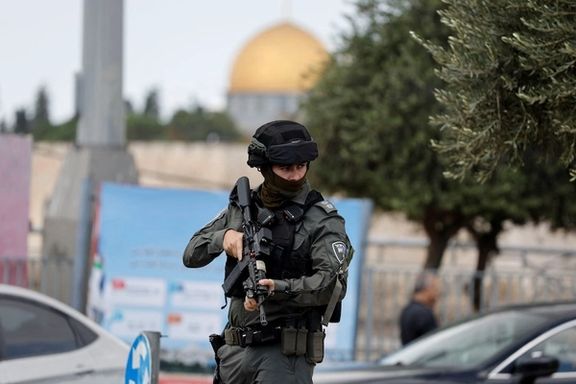
Two Israeli soldiers have been accused of spying for Iran while one operated the country’s Iron Dome air defense system, sharing highly classified footage of it in operation.
According to a joint statement by Israel police and Shin Bet, the two suspects had been lured by social media, as seen in previous cases.
"They understood that they were in contact with an Iranian operator, based, among other things, on their media publications, which revealed at the time the arrest and interrogation of Israeli citizens who were in contact with Iranian intelligence elements and carried out similar missions for them," the statement said.
The pair have been named as Yuri Eliaspov and Georgi Andreev, residents of Krayot in northern Israel.
Eliaspov, the main suspect, admitted that he sent his Iranian operator a video he recorded of the Iron Dome operating system. "I got into a difficult financial situation,” he told prosecutors.
Iranian spy plots in Israel increased 400% last year in the wake of the Gaza war, with dozens of cases in Israel foiled involving dozens more Israeli citizens. Some of the most serious included plots to murder the likes of Israel's Prime Minister and Defense Minister.
Superintendent Sarit Peretz, an investigation officer in the National Unit for the Investigation of Serious and International Crime in Lahav 433, said in a statement: "Yuri Eliaspov is charged with the offense of aiding the enemy in war, the most serious offense in the law book, the penalty for which is life imprisonment or death,” though Israel has only enacted the death penalty twice since its founding in 1948.
“Anyone who received Yuri's video [of the Iron Dome] and understands these systems could act against the State of Israel, which is very dangerous. The video contains very sensitive information," she added.
She said that Eliaspov claims only to have sent part of the video and not all of it. “Even the part he says he sent contains great danger,” she said.
Israel's Iron Dome air defense system is 90 percent effective and has protected the country from thousands of missile, rocket and drone attacks from Iran and its allies around the region such as the Houthis in Yemen and Hezbollah in Lebanon.
Asher Ben-Artzi, the former head of Israel’s Interpol, said the cases show a constant pattern in how Iranian intelligence is working to recruit Israeli citizens.
“They manage to recruit Israelis, mainly from the weakest strata of society, to whom they promise to make easy and quick money. This affair that has now been revealed was a great success for them after they managed to locate a reservist stationed in a sensitive unit and the assessment of the security officials is that the information they provided did indeed cause damage,” he told Iran International.
“The fact that they gained access to IDF soldiers, even in reserve service, is very worrying.”
The two were lured like others in recent months, by initially being asked to spray ‘children of Ruhollah’ graffiti in Tel Aviv, referring to the original founder of the Islamic Republic.
Eliaspov then shared the opportunity with his friend Andreev, and convinced him it was easy money.
By the time he was caught, Eliaspov had earned $2,500, while Andreev only $50. Both have admitted they are guilty of the charges and remain in custody until the next hearing on Friday in Haifa.
The pair began communicating with the agent in late September and have been under investigation for two weeks. They were both discharged immediately from Israeli military service.
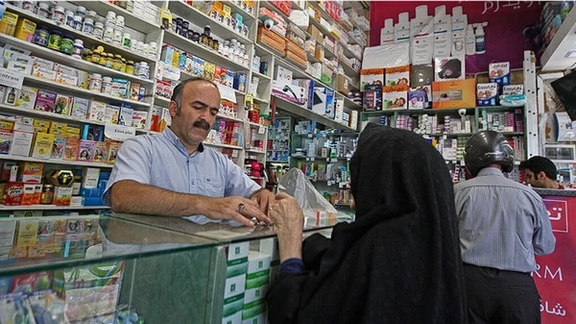
Rising drug costs are putting essential medicines out of reach for many Iranians with three in ten leaving pharmacies without their medications, according to the Iranian Pharmacists Association.
“The increase in the price of certain medications has shocked the public, with three out of every ten people who enter a pharmacy choosing not to purchase their medication," said Hadi Ahmadi, a board member of the Iranian Pharmacists Association, on Sunday.
"Why should such a situation occur where people refuse to take their medication or cannot afford to buy it? Out-of-pocket expenses for outpatient treatments have risen and now exceed 50%."
Reports have highlighted the financial strain caused by medication price increases. According to Tasnim News Agency, medication costs have surged by up to 400% since the removal of subsidized foreign currency.
Labor union activists and retirees warn that these steep prices are putting essential treatments out of reach for many, including those at risk, as more than one third of Iran is now living below the poverty line.
Shahram Ghaffari, Deputy for Treatment at the Social Security Organization, said on Sunday that the Food and Drug Administration implemented the increases to address shortages and support producers.
However, he criticized the lack of coordination with insurance providers, which has left patients covering the full cost of the hikes.
"Prices were not updated in insurance systems," he explained, "resulting in significantly higher out-of-pocket costs."
President Masoud Pezeshkian’s 2025 budget reduces foreign currency allocations for essential goods by 20%, while increasing the subsidized exchange rate by 35%.
Pharmaceutical manufacturers, already grappling with higher production costs, face significant challenges securing the resources they need.
The broader economic downturn has exacerbated the problem. Iran’s rial has lost nearly 40% of its value since September, further restricting the ability of the pharmaceutical sector to import raw materials.
Mehdi Pirsalehi, head of the Food and Drug Organization, said earlier in January that the government owes over $4.47 billion to pharmaceutical companies, with additional debts for medical equipment.
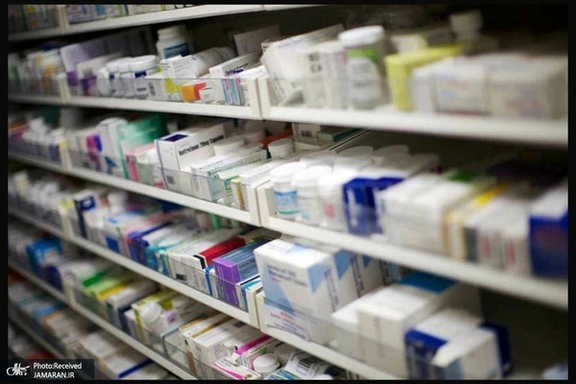
While Health Minister Mohammadreza Zafarghandi has promised to alleviate the burden by compensating insurance companies, critics argue the measures fall short.
The government’s elimination of a $9 billion subsidy for essential goods in 2022, which was introduced to counter earlier currency crises, is widely blamed for exacerbating inflation and shortages.
Now, as president Pezeshkian plans to reduce the allocation for importing essential goods—including agricultural products, pharmaceuticals, and raw materials—to €12 billion, as outlined in the 2025 budget released in October, both patients and healthcare providers are bracing for a challenging year ahead as the new Iranian year approaches.